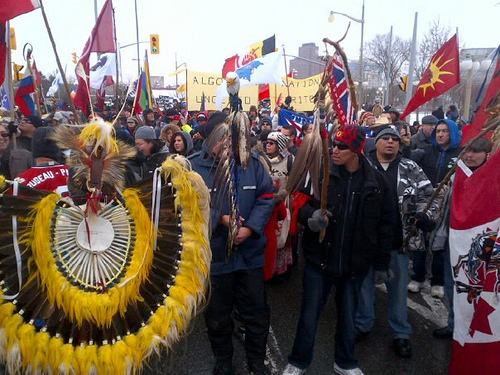Is this finally the moment that Canada’s First Nations’ civil rights revolution has genuinely begun?
In the U.S., despite a series of failed uprisings, black Americans endured slavery and segregation for centuries until the great civil rights movement of the 1960s led to unprecedented progress, though the struggle for justice and equality is far from complete even now. The history of aboriginals in Canada is a similar chronicle of injustice and discrimination, and despite repeated attempts over the decades to fight back — think Oka or Caledonia or the Lubicon — inequality and humiliation remain the daily fare for most.
Does Idle No More signal that a sustained new campaign for aboriginal rights is finally under way, or is this just another in a long tradition of false starts? Obviously no one yet knows. But this can be said: One of the reasons for whatever successes African Americans achieved 50 years ago was the participation in their campaign of millions of white Americans. It was a black movement, no mistake, with leadership, strategy, inspiration and numbers all provided by black men and women. But it was significantly bolstered by the active support of whites. Like it or not, that made white politicians pay more attention.
Is this not the moment then for Kalle Lasn, brainchild behind Adbusters magazine and the godfather of the Occupy Movement, to summon us to battle once again, this time mobilizing behind Idle No More? It seems to me there’s real potential for a genuinely mass movement of the kind that Stephen Harper has signally failed to encounter to this point. Hundreds of thousands, and more likely millions, of Canadians are furious at his government for one or another of its cornucopia of transgressions, and have largely protested sitting on their backsides.
Why angry Canadians have remained so passive is something of a mystery, although the Canadian Occupy movement seemed to have at least the moral support of many. But the originality of Occupy was also its ultimate undoing, offering crucial lessons that Idle No More would be foolish to ignore. Beyond being on the side of the 99 per cent against the 1 per cent — symbols of deepening inequality that Occupy helped popularize — Occupy’s proud lack of leadership and a coherent agenda soon became a fatal defect. A protest movement must have clear, achievable demands. After only months, Occupy in Canada fizzled out with barely a whimper.
This lesson was evidently not absorbed by Attawapiskat Chief Theresa Spence, who should have ended her hunger strike when the Prime Minister agreed to meet her and other chiefs. Now, instead of celebrating that real victory, she might well die for reasons that no longer make ethical, constitutional or political sense to many of her original defenders. Those who once supported her fast should tell her so in no uncertain terms, before it is too late.
Meanwhile, former Occupy backers are still looking for the cause they can throw themselves into, this time with more substance and strategy. Isn’t Idle No More’s honourable and resolutely non-violent struggle for aboriginal justice the answer?
Add to these other logical supporters: Quebec students who claimed to be marching for the larger cause of social equality; the besieged trade union movement (a good chance to show what it can still do); those many thousands of concerned Canadian citizens working for social justice for the poor both here and abroad; feminists whose organizations have been systematically defunded by the Harper government and for whom stopping violence against aboriginal women is a self-evident priority; all sensible human beings who are terrified of global warming; and countless NDP, Liberal and Green supporters who are committed to social justice.
Mobilized in solidarity, these groups would constitute a genuine mass movement, a righteous crusade that even Stephen Harper couldn’t ignore. After all, such a coalition would especially threaten his fierce determination that resource exploitation must trump any and all environmental and aboriginal concerns.
But I don’t want to be foolishly romantic here, any more than I would idealize the American civil rights movement which was far from a united fighting force. The Canadian experience can be no different, as we already observe. Heaven knows there are obstacles enough to any aboriginal revolution here, rooted in the proliferation of First Nation communities with their inevitable differences and even conflicting interests and approaches, as well as the deep-rooted prejudices and vested interests of the larger white society. Should we be surprised that First Nations disagree among themselves quite as much as whites do? To expect anything else is to impose on aboriginal Canadians qualities that we expect of no other people, certainly not ourselves.
The multiple grievances harbored by aboriginal peoples are largely legitimate, but they are longstanding, highly complex, and sometimes seemingly intractable. They will only be settled with great difficulty and endless goodwill on all sides, a commodity in short supply. In the Harper government, First Nations face a tough and not particularly sympathetic negotiating partner. A huge groundswell of non-native support for Idle No More will help remind Mr. Harper that this movement is not going away any time soon.
This article was first published in the Globe and Mail.



